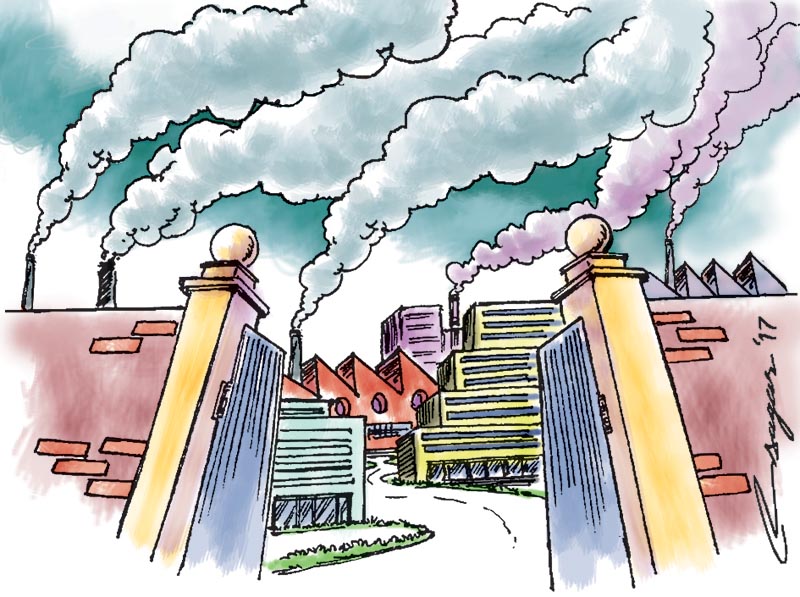Set emission limits: Mitigation priority
Science proves that the climate change is very real and politicians still debate whether it is real or not. What a pity! This is exactly the opposite of what actually it should be. There should be no debate whether one accepts climate change or not because individual acceptance or denial does not stop the process of climate change in any manner
The 23rd Conference of Parties (CoP23) ended with an agreement, among others, to prepare a ‘rule book’ next year in Poland for the implementation of the Paris Agreement but the Emissions Gap Report by the United Nations Environment Program (UNEP) already revealed, right ahead of the CoP that, the Nationally Determined Contributions (NDCs) i.e. the voluntary emission reduction pledges by the parties will only help achieve one third of what is envisioned in the Paris Agreement.
It is seen that most of the countries with a negligible individual share in the global Green House Gas (GHG) emission are facing the greatest threats caused by climate change. The Least Developed Countries (LDCs) and Small Island Developing States (SIDS) lamented the same on the 23rd CoP and pleaded with the top emitters to cut down emissions.
Lamenting and pleading are the things they mostly do in such negotiations, because they cannot pressurize the top emitters as it is those same top emitters from whom they are getting (also expecting more) technical and financial helps for mitigation and adaptation programs.
Mitigation of climate change is far better than adaptation. Any life form in this earth except human beings can neither project the degree of change in climate in the future nor understand humans’ projection and get prepared for this change. Those species which can face the unprecedented change will persist and those which cannot will go extinct.
Therefore, adaptation programs work well only for humans if at all. So mitigation should be of higher priority than the adaptation programs. Hence, the emissions should be reduced in a manner that there will be no further necessity of adaptation programs in the days ahead.
But how to reduce the emissions has become the main issue at the present. When the climate scientists already warned that climate change is a grave threat to human existence itself, is it not time to set appropriate Annual Emission Limits for each country ensuring that the temperature rise does not exceed the threatening level?
The Intergovernmental Panel on Climate Change (IPCC) should be given the full authority over it and each country should abide by the guidelines developed by it. The population size of the country might become one of such bases for setting such limits.
Science proves that the climate change is very real and politicians still debate whether it is real or not. What a pity! This is exactly the opposite of what actually it should be.
There should be no debate whether one accepts climate change or not because individual acceptance or denial does not stop the process of climate change in any manner.
These are many funds established for the climate change mitigation and adaptation programs. The Adaptation Fund, the LDC Fund, the Green Climate Fund (GCF) are some of them. Let us take an example of the REDD program which is supposed to receive payments, after 2020 AD based on the results presented, from the GCF.
According to the Transparency International’s latest release, 87.5 per cent (56 of the 64 countries) partner countries of the UN-REDD program have a serious corruption problem, i.e. Corruption Perception Index (CPI) score of less than 50 out of 100. (2016 AD)Data is not available for five countries.
Eighty-three percent of those countries (53 of the 64 countries) have CPI of less than the global average score of 43. So, will the REDD investment actually benefit the ground level, poor communities who are ignorant of this vast technical issue?
Optimistically, there are safeguards. The better thing is that there are seven of them. But, would the safeguards really work, should the countries be so corrupt? The corruption in these countries is so rampant because the people there are very good at outsmarting the policies. There is no assurance that the safeguards will be wisely adhered to.
Now, if paid for the results based payments, disparity increases within the country (as they are highly corrupt and the fund will mostly go to the hands of influential politicians and top-level bureaucrats) and, if not paid for failing to meet the safeguards, the investment for the REDD readiness goes to waste, thereby only increasing the country’s burden on the climate budget.
Those who will be able to present the convincing results will be paid and the others will be left behind, which increases the disparity between the countries again. But, a lot of scientific research needs to be done before jumping into the conclusions.
Hence, if obligatory Annual Emission Limits are set for each country based on scientific standards, no organism will have to suffer from the impacts of climate change. Who suffers more and who suffers less will no more be an issue. It is difficult to understand why humans are creating the problems and making each innocent organism in the earth suffer?






